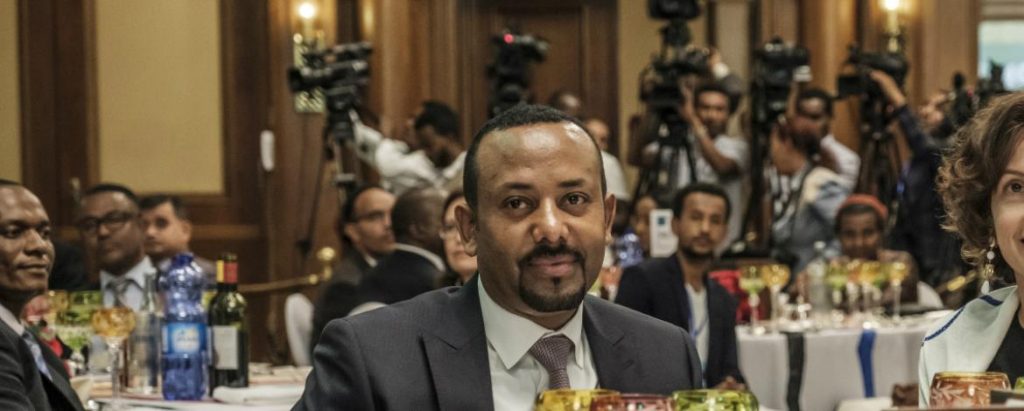
Following press freedom’s spectacular progress in Ethiopia since last year’s change of government, Reporters Without Borders (RSF) has written to Ethiopian Prime Minister Abiy Ahmed recommending measures that will promote quality journalism and help ensure that the freedom to inform takes a lasting hold in his country.
Prime Minister Abiy Ahmed
Office of the Prime Minister
P.O. Box 1031, Addis Ababa
Ethiopia
Paris, 21 May 2019
Dear Prime Minister,
For the first time in more than ten years, your country no longer has a single journalist in prison. Since you became prime minister in April 2018, your government has authorized hundreds of newspapers, news websites and TV stations that were banned under the previous regime. After years of repression in which they constantly risked imprisonment or had to flee abroad, journalists can now freely play their role as a counter-power. This rapid and spectacular progress enabled Ethiopia to jump 40 places in the 2019 World Press Freedom Index, compiled by Reporters Without Borders (RSF). This is the biggest rise by any country in the world since the Index was launched in 2002.
This progress was unanimously hailed at the event that UNESCO organized in Addis Ababa on 3 May to mark World Press Freedom Day. As you said in your address on this occasion, Ethiopia is now at a “pivotal” moment and will only be able to realize its true democratic potential if “those who are tasked with the duty to inform are aware of the responsibilities that come with such freedom.” It is indeed essential to help the media to professionalize, so that they can fulfil their independent watchdog role without fuelling the tension and conflicts in which your country is embroiled. The journalists RSF met during its recent visit to Ethiopia are fully aware of these challenges. Their plan to create a representative union and their desire to eventually establish an inclusive and professional self-regulatory body testify to their determination to combine freedom with responsibility.
While the freedom to criticize and media pluralism are now realities, much needs to be done so that quality journalism can flourish. Since you became prime minister, abusive prosecutions of journalists, based above all on the 2009 terrorism law, have ceased but the promised and indispensable overhaul of the draconian and repressive media laws has yet to materialize. RSF is also concerned about a bill designed to criminalize fake news and hate speech, which could be diverted from its original goal and could be used to prosecute journalists.
Under the old regime, the threats to reporting freedom were easily identifiable. They came mainly from the authorities. The red lines and risks were well known. Nowadays, the dangers are more diffuse. Two Mereja TV journalists were attacked by unidentified persons in the Oromia region on 23 February, just moments after being briefly detained by the local police in Legetafo after questioning newly displaced persons whose homes had been destroyed. Ethnic conflicts are still hard to cover, and many journalists told RSF that their media outlets did not dare send them to report on these stories, above all for security reasons.
Finally, the disbanding of the Government Communication Affairs Office (GCAO), which centralized media requests, has unfortunately not been accompanied by any improvement in access to state-held information. The two press conferences you have given have not sufficed to satisfy journalists’ legitimate expectations during this transition period. Government communication is still insufficient and too few ministers make themselves available for answering questions from the media.
In order to institutionalize a high-quality public debate and ensure that the freedom to inform becomes a solid and enduring pillar of Ethiopian society, RSF recommends:
- The rapid adoption of legislation that encourages media freedom, independence and pluralism by abolishing prison sentences and exorbitant fines for press offences, in accordance with the highest international standards.
- Revision of the bill on inciting hatred, so that it includes guarantees making it impossible to bring abusive prosecutions against journalists in connection with their work.
- The creation of a national mechanism for the protection of journalists in order to end impunity for abuses and crimes of violence against media personnel, as recommended in the United Nations Plan of Action on the Safety of Journalists.
- More transparency on the part of government officials and politicians about their activities, so that the public is better informed; in particular, a greater readiness to answer journalists’ questions.
- A fair, balanced and transparent allocation of state advertising and assistance to the media in order to encourage a pluralistic media landscape, one in which criticism is not punished by the withdrawal of state company advertising.
- An end to Internet cuts and to the disconnection of social networks, so that the unrestricted flow of online information is guaranteed throughout the country in accordance with international law.
We thank you in advance for giving this letter all the required attention.
Sincerely,
Christophe Deloire
Secretary-General
Source: Reporters Without Borders


